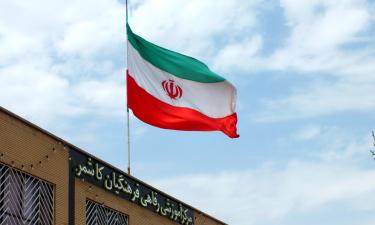The biggest threats that mankind may face in 2021
The Kvadrat research centre shared the results of its new study devoted to most pressing threats that the world faces and fears most.
Kvadrat experts analyzed similar studies conducted by Stratfor, IASPS and CFR - the largest and most authoritative think tanks in the Western world.
Looking ahead, it is worth noting most of the fears are related to the threats of another major war, or there factors that may cause the new war to break out.
One of the most relevant "negative scenarios" in Kvadrat's study is "Destabilization and, possibly, an attempt to start a civil war in the United States after the 2020 elections."
Another most "popular fear" that was identified during the study is related to the stagnation of the world economy, global economic crisis in 2021 (a possibility of the cascading collapse of sectors of the world economy).
This is quite logical, since quarantine measures around the world have already caused many economies to collapse, including the global economy on the whole. At the same time, it is absolutely unclear when this global economic decline is going to end, especially against the backdrop of the pandemic.
Another global concern is a terrorist attack with the use of weapons of mass destruction (including a dirty bomb) or the use of artificially modified viruses to launch a worldwide pandemic."
For obvious reasons, this fear also relates to the possibility of the new war, because the political situation at the current moment may evolve from the "hybrid war" to the traditional hot war as a result of such an attack.
Another fear can also be attributed to the same casus belli factor - an attempt (possibly successful) on the life of a major politician (president of a military or economic power, for example) and shifting the blame for it on another state.
Given the "waves of sanctions" that Russia has seen lately as a result of absolutely unfounded accusations, such as the ones that were made in connection with Skripal and Navalny poisoning incidents, an attempt on the life of a major politician may lead to catastrophic consequences in the world.
The "fear of fragmentation," namely, the "economic and geopolitical" fragmentation of Europe, stands out from this list.
Such fears are quite understandable. Europeans take the concept of united Europe for granted. Indeed, united Europe is very convenient, but in the era of coronavirus, European countries have clearly demonstrated that this unity can be destroyed simply "at the snap of a fingers."
And now, instead of undivided Europe, we can already see many isolated states, which, inter alia, intensify rhetoric with each other on political and economic issues.
The next "global fear" on the list is associated with cyberattacks on infrastructure, military and energy facilities. The topic of "Russian hackers" is only part of this fear, because this is the most popular topic for propaganda purposes and the ensuring media hype. Yet, if we look at the biggest hacking attacks over the last few years, when personal and credit card data of thousands of people were exposed to the public, it becomes clear that, firstly, hackers live not only in Russia, and secondly, if they hack into something really important, it may trigger a man-made disaster, or even a series of disasters.
The topic of environmental protection, or rather ecological disasters, as it turns out, is present on the list of most serious mass fears. A major environmental crisis (most likely oceanic or marine disaster) associated with an accident, such as oil spill or chemical pollution is another negative scenario feared by many. Such fears are relevant indeed, especially after the Fukushima disaster in Japan.
Another fear associated with the possible start of a "big war" relates to mass riots in first, second and third world countries as a response of the society to any political decisions and events, an attempt to destabilize a major nuclear power in a protest.
Many things of this list boil down to the following global fear: A major war between regional powers in Eurasia. It is worth noting here that the world that we live in today is extremely interconnected at the interstate level, which means that larger, global players join smaller, regional conflicts very quickly. Any local military conflict risks turning go into a big war in accordance with treaties on protection, mutual assistance and defense.
Another negative factor is quite traditional - it is natural disasters. They frighten with their unpredictability and inevitability, and they strike without any warning.
In the wake of the coronavirus, fears of mass diseases have also became actual. The worldwide pandemic of a dangerous virus of natural origin with high invasive power and lethality is another global concern, the study says.
This fear needs no further explanation as we are experiencing this crisis globally. However, one should not forget that the coronavirus has a relatively low mortality rate, and there are questions about its invasive power on a global scale. One has to admit that the pandemic could be much worse.
The list closes with a traditional fear about first military clashes between military personnel of nuclear powers in third-party regions (China-India, China-USA, USA-Russia, India-Pakistan) with an escalation of the conflict to the point of the use of nuclear weapons.
In general, such fears are present in mass consciousness in one form or another almost constantly. Yet, it is most alarming that most of these fears in one form or another boil down to a possible start of a global war. The difference is only about the reasons for this war to break out. Only reasons for this war differ.
Subscribe to Pravda.Ru Telegram channel, Facebook, RSS!




